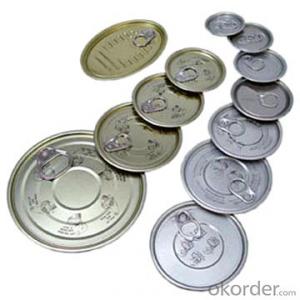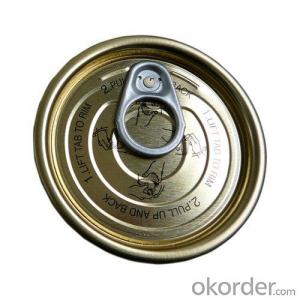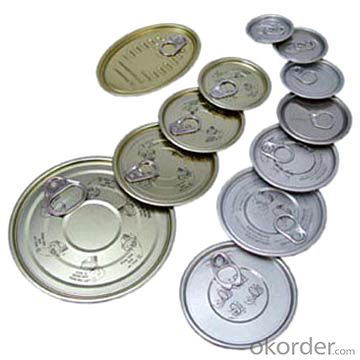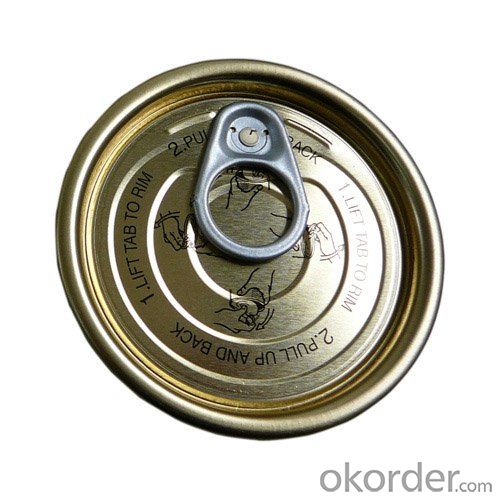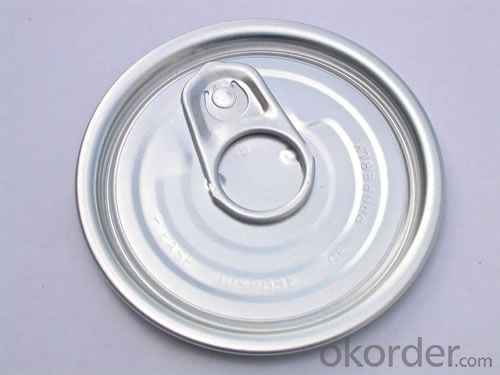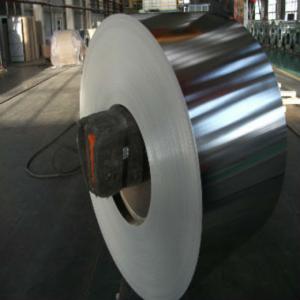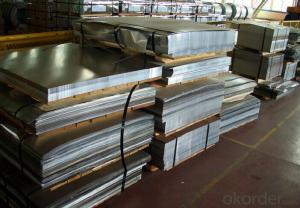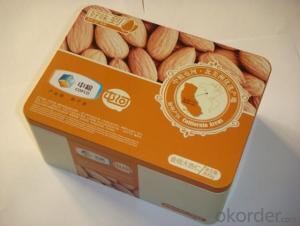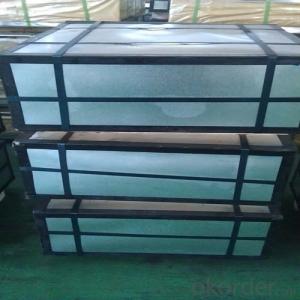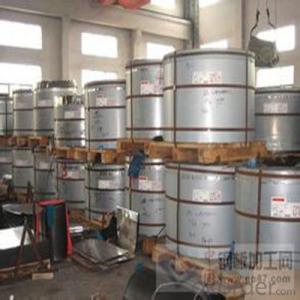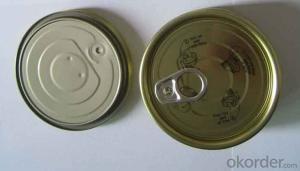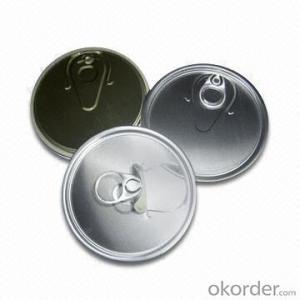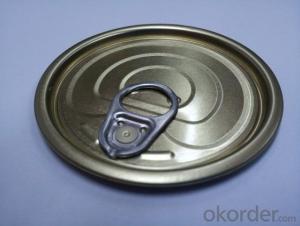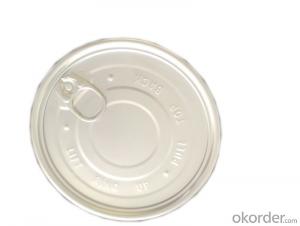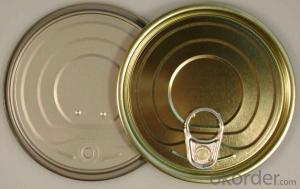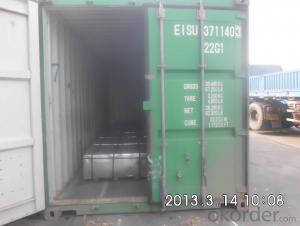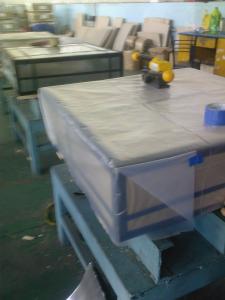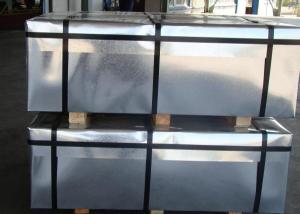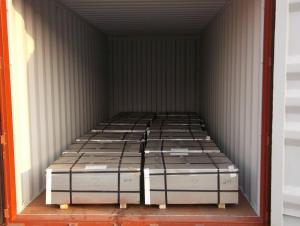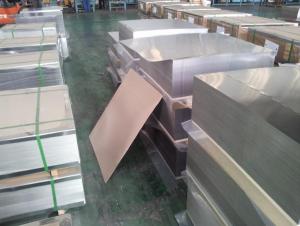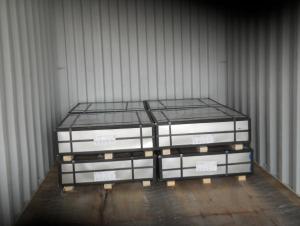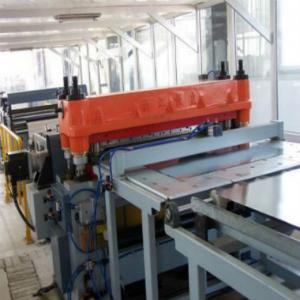High Quality Easy Open End,Tinplate Material, Size 52mm
- Loading Port:
- China main port
- Payment Terms:
- TT OR LC
- Min Order Qty:
- 100000 PCS
- Supply Capability:
- 10000000 PCS/month
OKorder Service Pledge
OKorder Financial Service
You Might Also Like
Quick Details
Metal Type: Tinplate
Feature: Aseptic, Full open
Printing Handling: UV Coating, Varnishing
Custom Order: Accept
Model Number: 202# 52.5mm
Name: Easy open end line
Inner coating: Organosol
Shape: Round
Packing: Paper tube+pallet
Specifications
1.Easy open end line
2.Coating:Epoxy phenolic
3.Material:tinplate
4.Dia:52mm
5.Factory,Can offer OEM service
Name | easy open end line |
Item No. | 202# |
Shape/type | Round |
Size(mm) | Dia 52 |
Coating | Epoxy phenolic |
Material | Tinplate |
Pcs/20 GP’ | 3,040,000 Customize packing: as clients’ requests. |
Features | 1.Used for packaging of tomato paste,jam,salad…etc. 2.Coating can be according to the customer required.
|
Our packing
We could offer package as customers require, by carton or by wooden pallet.
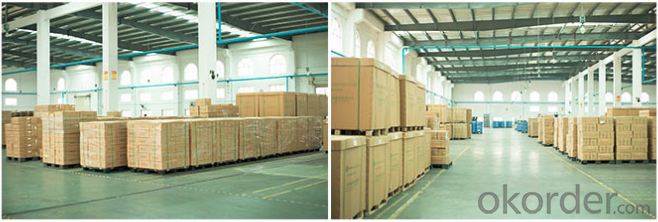
Our Workshop
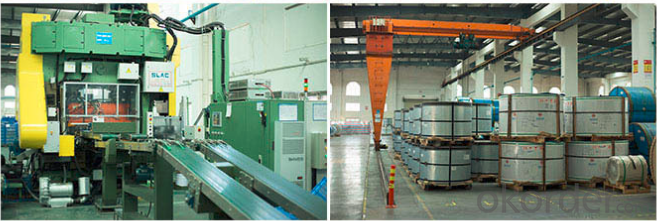
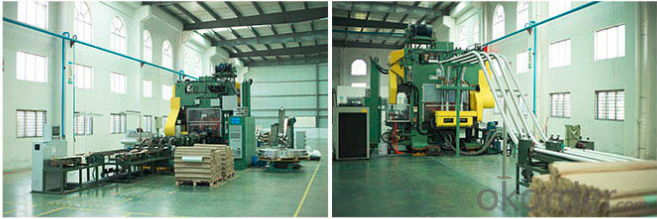
FAQ
1.Q: What is the material of EOE?
We can offer both tinplate and aluminum material made EOE;
2.Q:Could you offer samples for our testing?
YES, we could offer sampler for free if needed;
3. Q:Can you make new mold with customized size I need?
YES, We can make mold for you if reach some qty.
- Q: Can tinplate packaging be used for automotive products?
- Yes, tinplate packaging can be used for automotive products. Tinplate is a versatile and durable material that provides excellent protection for automotive parts and components. It is commonly used for packaging automotive products such as lubricants, chemicals, and small parts. Tinplate packaging offers good resistance against corrosion, impact, and tampering, making it suitable for automotive industry requirements.
- Q: Can tinplate be used for packaging perishable goods?
- Yes, tinplate can be used for packaging perishable goods. Tinplate is known for its excellent resistance to corrosion and its ability to provide an airtight seal, making it suitable for preserving the freshness and quality of perishable products such as food and beverages.
- Q: Can tinplate packaging be used for pet food products?
- Yes, tinplate packaging can be used for pet food products.
- Q: Can tinplate be used for aerosol cans?
- Yes, tinplate can be used for aerosol cans. Tinplate is a commonly used material for making aerosol cans due to its durability and ability to resist corrosion. It also provides a barrier against oxygen, moisture, and light, ensuring the contents of the aerosol can remain protected.
- Q: How does tinplate contribute to the preservation of tobacco products?
- Tinplate contributes to the preservation of tobacco products by providing a durable and airtight packaging solution. The tin coating on the steel sheet prevents the tobacco from exposure to moisture, light, and oxygen, which can degrade its quality. Additionally, tinplate offers protection against physical damage, ensuring that the tobacco remains intact and fresh for an extended period of time.
- Q: Can you tell me how to deal with the recycling of tinplate?
- The tin is magnetic, is easy to recycle scrap. Second, waste tin as scrap iron and steel melted, make steel containing a small amount of tin (less than 0.1%), to improve the performance of cast iron.
- Q: What are the main applications of tinplate in the beverage industry?
- Tinplate is mainly used in the beverage industry for the production of cans and packaging materials. It provides a protective barrier against corrosion, ensuring the product's integrity and extending its shelf life. Tinplate cans are lightweight, easily stackable, and offer convenient storage and transportation. Additionally, tinplate's ability to be printed and decorated makes it ideal for branding and marketing purposes in the beverage industry.
- Q: What are the main challenges in tinplate storage and transportation?
- The main challenges in tinplate storage and transportation include ensuring proper protection against rust and corrosion, maintaining temperature control to prevent damage to the tinplate, preventing stacking or handling errors that may result in dents or scratches, and ensuring efficient logistics to minimize delays and damage during transportation. Additionally, complying with safety regulations and maintaining adequate inventory management are also significant challenges in tinplate storage and transportation.
- Q: How does tinplate contribute to the shelf life of beverages?
- Tinplate contributes to the shelf life of beverages by providing a protective barrier that prevents contact between the beverage and its container. This barrier helps to prevent oxidation, contamination, and the transfer of flavors, ensuring the beverage stays fresh and retains its quality for a longer period of time. Additionally, tinplate containers are resistant to corrosion, maintaining the integrity of the packaging and further extending the shelf life of the beverages.
- Q: What are the common challenges in processing tinplate?
- Some common challenges in processing tinplate include maintaining consistent thickness and coating quality, minimizing dents and scratches, ensuring proper adhesion of the tin coating, preventing corrosion or rusting, and achieving precise shaping and forming without cracking or distortion.
Send your message to us
High Quality Easy Open End,Tinplate Material, Size 52mm
- Loading Port:
- China main port
- Payment Terms:
- TT OR LC
- Min Order Qty:
- 100000 PCS
- Supply Capability:
- 10000000 PCS/month
OKorder Service Pledge
OKorder Financial Service
Similar products
Hot products
Hot Searches
Related keywords
